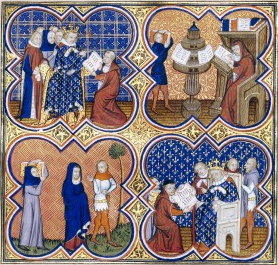Ancient Greek 101
- Introduction to Ancient Greek Culture
- Basics of Ancient Greek Language
- Ancient Greek Literature
- Basics of Ancient Greek Language II
- The Philosophers of Ancient Greece
- Intermediate Ancient Greek Language Practice
- The Birth of Democracy
- Intermediate Ancient Greek Language II
- Ancient Greek Mythology
- Advanced Ancient Greek Language
- Arts and Architecture in Ancient Greece
- Advanced Ancient Greek Language II
Intermediate Ancient Greek Language II
Practice Translation in Ancient Greek

Transfer of the meaning of something in one language into another.
Translation is a crucial skill in language learning, especially when dealing with a language as rich and complex as Ancient Greek. This unit focuses on honing your translation skills, understanding cultural nuances, and facilitating peer review and interactive discussions.
Translation of Texts
The first part of this unit involves translating simple texts from Ancient Greek to English and Chinese. This exercise will help you apply the vocabulary, grammar, and idiomatic expressions you've learned so far. Remember, translation is not just about converting words from one language to another. It's about conveying the same meaning and sentiment.
Understanding Context and Cultural Nuances
Ancient Greek is a language deeply rooted in its culture. Therefore, understanding the cultural context is essential for accurate translation. For instance, certain idioms or phrases may not have a direct equivalent in English or Chinese but can be explained in a culturally relevant way. This part of the unit will help you understand these cultural nuances and their importance in translation.
Peer Review and Feedback
Learning from others is a valuable part of any educational journey. After you've completed your translations, you'll engage in a peer review process. This involves reviewing a classmate's work and providing constructive feedback, and in turn, receiving feedback on your work. This process not only helps improve your translation skills but also fosters a sense of community in the virtual classroom.
Interactive Online Discussion
The unit concludes with an interactive online discussion. This is an opportunity for you to share your experiences, challenges, and strategies related to translation. It's also a chance to learn from your peers who might have different insights or approaches. These discussions will be guided by the instructor but are largely student-led.
By the end of this unit, you should have a deeper understanding of the intricacies of Ancient Greek translation. Remember, practice is key in language learning. So, keep translating, keep learning, and keep exploring the fascinating world of Ancient Greek.